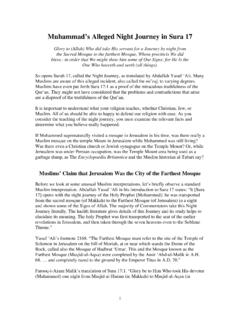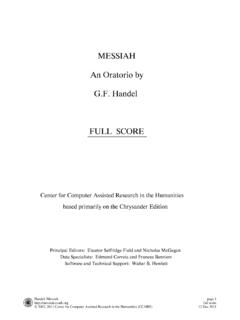Transcription of B Conclusion J MESSIAH THE FINAL SACRIFICE
1 BUT THE SACRIFICE OF JESUS WAS ONCE AND FOR ALL and it never needed to be repeated. Accep-tance of the SACRIFICE of Jesus does not bring temporary atonement but permanent forgive-ness. By accepting the substitutionary death of Jesus for his sins, one is not continually re-minded of those sins, but one receives a com-plete cleansing. By which will we have been sanctified through the offering of the body of Jesus Christ once for all." And every priest indeed standeth day by day ministering and offering often times the same sacrifices, for which can never take away sins: but he, when he had offered one SACRIFICE for sins forever, sat down on the right hand of God; henceforth electing till his enemies be made the footstool of his feet.
2 For by one offering he hath perfected forever them that are sanctified. (ASV-Hebrews 10:10-14) This passage again points out how the high priest had to SACRIFICE day in and day out, and his work was never done. The high priest is viewed as standing to indicate this unfinished ministry. But Jesus, who offered Himself as a SACRIFICE "once and for all," is viewed as sitting at "the right hand of God," thus showing that His work is complete. Furthermore, the animal sacrifices provided a yearly atonement but never permanently took away sins.
3 But those who accept the sacr ifice of Jesus are perfected forever; their sins are permanently removed. As to the question, "Why did the MESSIAH have to die?" according to the new Testament, the reason is twofold: 1. To fulfill all Old Testament prophecies and requirements. 2. To bring in a permanent atonement rather than a tempo-rary one. Conclusion The Conclusion of both the Old and New Tes-taments is that the means of redemption was by blood, and the permanent blood SACRIFICE was to be the MESSIAH Himself. That is why the MESSIAH had to die according to the Old Testa-ment.
4 That is why Jesus did die according to the New Testament. Who killed Jesus was never the issue as far as the New Testament was concerned, for the MESSIAH had to die. It only became an issue years later because of anti-Semites seeking excuses to persecute the Jews. The only issue of the new Testament it-self is whether one will accept the substitu-tionary SACRIFICE of Jesus for himself or not. MESSIAH THE FINAL SACRIFICE He shall see of the travail of his soul, and shall be satisfied: by the knowledge of himself shall my righteous servant justify many; and he shall bear their iniquities.
5 Isaiah 53:11 (ASV) Aleppo Codex, circa 930 Masoretic text containing Isaiah 53 the whole concept of a dying MESSIAH is so for-eign to modern Judaism, although it was once part of Judaism, there is a question that must be answered: Why did the Mes-siah have to die? In the course of answer-ing this question, a second one arises: What is the means of redemption? If there is one theme that seems to go throughout all of the Scriptures, it is the theme of redemption by blood. According to the Old Testament Redemption became necessary when sin entered the human sphere and separated man from God.
6 When Adam and Eve com-mitted that first act of disobedience, sin entered and separated them from God. From that point on, the means of bridging the separation of man from God was the means of blood. In the history of God's dealing with His people, the means of re-demption was always by blood. Since The redemptive element of blood begins to come into the theme of Scripture at the same time that sin does, for until sin came, no blood was necessary. We read that just as soon as man was expelled from the Garden of Eden: "Jehovah God made for Adam and for his wife coats of skins, and clothed them" (Genesis 3:21).
7 The skins were animal skins. The naked-ness, that the element of sin now revealed, needed to be covered. But the covering re-quired the death of several animals and so, for the first time in history, blood was shed. This provides the root meaning of the Hebrew word for atonement, which is "a covering." As biblical history develops in the Book of Genesis, we find that all those with whom God was pleased came to Him by means of blood. Noah immediately offered up blood sacrifices when he left the ark. He was followed by other great men in Jewish history -Abraham, Isaac, Jacob - all of whom were careful to approach God by means of blood.
8 The redemptive element of blood ran through the entire Law with its 613 command-ments. A great summary statement for the entire Law was to be found in the third book of Moses, Leviticus 17:11: For the life of the flesh is in the blood; and I have given it to you upon the altar to make atonement for your souls: for it is the blood that maketh atonement by reason of the life. (ASV) It can easily be said that all of the Law re-volves around this one statement. There are commandments which God gave in the Law that were to be obeyed.
9 Disobedience was sin. If disobedience did take place, the means of atonement for the sin was blood. The principle stood throughout the remainder of Old Testa-ment history, but it was a burden to the indi-vidual. These blood sacrifices had to be re-peated year in, and year out, and they had to be done in the Temple at Jerusalem. It was Isaiah the Prophet who first provided the hope that the day would come when the burden would be lifted. In Isaiah 53, God de-clared that the Suffering Servant, the MESSIAH , would be the SACRIFICE for sin (Isaiah 53:10-11).
10 The point of Isaiah 53 is basically this: The animal sacrifices under the Mosaic Law were intended to be of temporary duration, a tem-porary measure only. God's intent was for there to be one FINAL blood SACRIFICE , and that would be the SACRIFICE of the MESSIAH Himself. This, then, was the reason MESSIAH had to die: to provide the blood SACRIFICE for sin once and for all. No longer would the Jews be burdened with the yearly sacrifices. All a person would need to do is to accept the MESSIAH 's death on his behalf and his sins would be forgiven.












